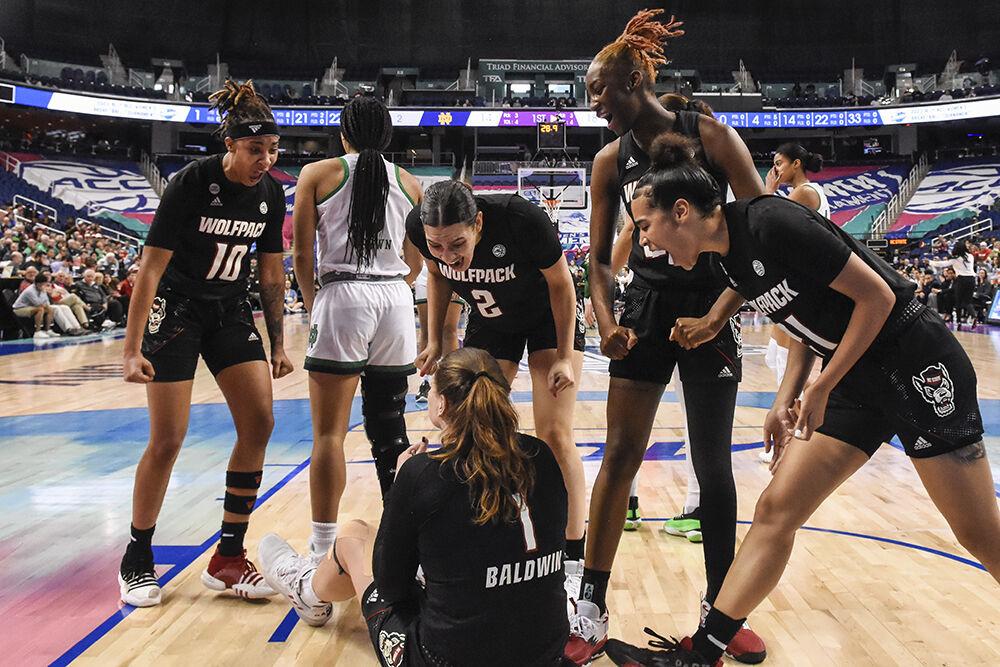
Hallie Walker
The NC State women's basketball team yells in celebration as graduate center River Baldwin gets fouled while shooting a basket during the quarterfinals game of the ACC tournament against Notre Dame in Greensboro Coliseum on Friday, March 3, 2023. River made four rebounds. NC State lost to Notre Dame 66-60.
With the NC State women’s basketball team’s 2022-23 season ending in the first round of the NCAA Tournament, many fans of the Pack stuck around on ESPN to watch the following rounds of the women’s tourney.
And they weren’t alone — the broadcasting company has recorded record-breaking viewership during this year’s tournament, with each round gaining more momentum from America’s viewers.
As the women’s championship game got closer and closer, more viewers flocked to ESPN to see how these dominant women would play. Eventually, LSU took the trophy in a thrilling game against the Iowa Hawkeyes by a score of 102-85.
While high viewership for a nationally-televised college championship game might seem normal, looking at the Instagram comments of ESPN or March Madness accounts would tell you otherwise. “Would y’all rather have courtside tickets to [the championship game] or $5?” and “Stop shoving it down our throats” are just some examples of the disrespect women’s athletics gets on social media.
What these commenters, and hundreds of others, might not realize is that NCAA women’s basketball is becoming a new genre of sports all on its own, one that is unique, fun and entertaining in its own right.
Before the 2021 NCAA Women’s Tournament, many people didn’t even notice the women’s tournament unless their own collegiate team was in it. It wasn’t until after a few social media posts from female student athletes, specifically showing the discrepancies between the men’s and women’s tournament resources, that the NCAA took a look at how disproportionate the coverage was.
“That’s all fine and good. It’s also low-hanging fruit,” wrote New York Times author Kurt Streeter. “Fifty years after the passage of Title IX, the landmark legislation that called for gender equity in educational programs receiving funding from the federal government, the NCAA was goaded into these simple changes after an internally ordered review blistered the organization for an old-school, male-centered approach.”
The year after, the women’s tournament used the “March Madness” branding for the first time in its 40-year history, and ratings shot up. NC State’s thrilling double overtime game against UConn garnered 2.04 million viewers — at the time, it was one of the largest audiences for a NCAA Women’s Tournament game in history.
NC State’s home game attendance has been growing as well, with the post-COVID-19 seasons racking up over 75,000 total attendees. Before the pandemic, these games could barely break 65,000 total attendees, but all that changed during the 2021-22 season when fans were let back in. Right here in Raleigh, this past 2022-23 season saw Reynolds Coliseum sell out eight times, along with season tickets selling at a rapid pace.
The 2023 Women’s NCAA Tournament was probably the best thing to ever happen to the sport. Not even considering the Final Four games, ESPN reported that viewership was up 42% from the previous year’s tournament, and the championship game this year between LSU and Iowa saw an 103% increase from last year. With players like Iowa’s Caitlin Clark dropping 40 points in two different games and South Carolina’s almost-perfect season, people from all over the nation are starting to realize that women’s basketball is exciting and prime-time television.
Women’s basketball is becoming more widely available to watch, too. NC State’s team appeared on an ESPN primetime channel, including ACCN, 19 times and was on ABC once this season. ESPN has had the rights to broadcast the tournament since 1996, but this year’s championship game was on ABC, marking the first time in decades that a women’s final has been on a broadcast channel. With a potential market value of $85 million, the women’s tournament deserves to be seen by a wider audience.
It’s time to end the narrative that women’s athletics aren’t as important as men’s. In fact, they can be a game-changer for athletic programs all over the country. Hearing comments making fun of women’s tournaments or sports in general aren’t funny anymore, but then again, they never were. All the facts are pointing to women’s basketball becoming bigger and better than ever, and it’s time to appreciate it.